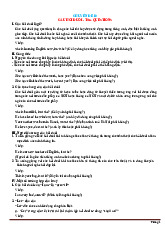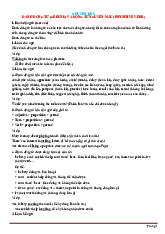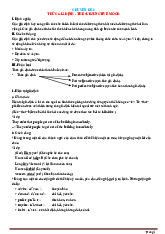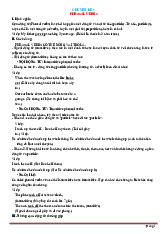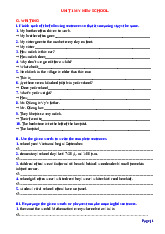


Preview text:
READING COMPREHENSION – FURTHER PRACTICE 1
Read the following passage and mark the letter A, B, C, or D on your answer sheet to choose the word or
phrase that best fits each of the numbered blanks from 1 to 5.
Reality shows have been around for longer than most of us can remember. TV producers find them cheaper to
produce than soap operas or dramas. And the format seems to be as popular as ever. (1) ______ shows are so
addictive that people can’t resist tuning in to them week after week. But why? Do viewers know how ‘real’ reality
TV actually is? Of course, some shows are better than others. When Romeo Met Juliet, (2)______, was convincing
enough for us to believe what went on in the show. But other shows are less real. (3) ______ are more likely to
tell contestants what to say and do than you may realize and the sob stories (4) ______ we hear each week are
more planned than ‘real’. Nevertheless, it seems that the more we watch reality TV, the more tempted we are to
believe it's all true. Is that such a bad thing? Well, one (5)______ could be that there is a lot more gossiping and
bullying on some shows than seems good for anybody.
(Adapted from Gold Experience by Edwards and Stephens) Question 1: A. Much
B. Little C. Many D. Each Question 2: A. however
B. for example C. therefore D. in addition
Question 3: A. Producers
B. Creators C. Constructors D. Inventors Question 4: A. where
B. who C. when D. which
Question 5: A. advantage
B. credit C. problem D. solution
Read the following passage and mark the letter A, B, C, or D on your answer sheet to indicate the correct
answer to each of the questions from 6 to 10.
Staying in hotels and resorts has been a traditional part of travel since the beginning of mass tourism. But
nowadays, many tourists want a more intimate experience. For this reason, they are choosing to 'go native'. This
often means staying in the kinds of places that local people inhabit. In big cities, you can try staying with the
friend of a friend. You may end up sleeping on the couch or the floor, but the advantages outweigh the discomfort.
The biggest plus is that you'll be staying with a local and seeing the city from a local perspective.
Another option is house-swapping. Several websites allow you to connect with people who want to trade
living situations. It's usual to exchange emails about favorite places in the city before the swap, meaning you can
have a truly local experience. But of course, you can only do this if you don't mind having strangers staying in your house.
For the more adventurous, staying in a native structure in an African village or a hut on the water in
Vietnam or Thailand can be a real thrill. These might not even include plumbing or electricity, and that is part of
the charm. The experience of dealing with oil lamps and carrying water really gives you a sense of how the people live..
No matter how unadventurous you feel, you might want to consider crossing hotels off your list. Getting
to know the local way of life is the most valuable part of travel. And what better way is there to do this than
staying where the local people actually live?
(Adapted from Solutions - Third Edition by Tim Falla and Paul A Davies)
Question 6: What is the passage mainly about?
A. New holiday accommodation trends
B. Adventurous holiday activities C. World heritage sites
D. Main tourist attractions in Asia
Question 7: The word "they" in paragraph 1 refers to ______ A. resorts B. hotels C. local people D. tourists 1
READING COMPREHENSION – FURTHER PRACTICE 1
Question 8: What is the biggest advantage of tourists' going native?
A. It enables them to experience the local lifestyle.
B. It offers them opportunities to make new friends.
C. It is more comfortable than staying in hotels and resorts.
D. It is cheaper than staying in other kinds of accommodation.
Question 9: The word "charm" in paragraph 3 is closest in meaning to ______ A. price B. attraction C. safety D. danger
Question 10: Which of the following is mentioned in the passage?
A. There are several websites used for house-swapping purposes.
B. Tourists to Thailand prefer staying in a native structure to staying in a hut.
C. Staying with local people is more popular than staying in hotels and resorts.
D. Dealing with oil lamps is the most thrilling experience for tourists to Vietnam.
Read the following passage and mark the letter A, B, C, or D on your answer sheet to indicate the correct
answer to each of the questions from 11 to 17.
Globalisation has affected most aspects of our lives. One area which has changed is education. More and
more people move to different countries for their studies. At the same time, more people stay at home and study
by distance learning. It is now easy to learn without attending a college or university, or attending less often.
‘Blended learning’ means studying partly in a traditional way in the classroom and partly online or via email.
Different countries have benefited from the globalisation of education in different ways. Students can get
an internationally recognised degree at a much cheaper price than going abroad and so can improve their chances
of getting a good job. At the same time, those in the countries providing world-class degrees also benefit. They
have greater access to ideas and knowledge from all over the world and having international students enrich their
universities. However, it is not good news for everyone in some developing countries. It is usually the elite who
are prosperous enough to have access to international education. Many people in rural areas have not even had a
primary education. Also, those areas usually do not have reliable internet connections and most people do not
own a computer. It will take a bit more time for international opportunities to reach everyone in developing
countries. Unfortunately, one concern people have about globalisation is that it can start to mean 'westernisation'.
In other words, local knowledge can be lost and money seen as more important than culture.
Educational institutions have changed their focus due to globalisation. There are so many benefits of
having overseas students that universities are competing for them, using strategies from the world of business.
There is also more emphasis on the student experience. There is more focus on customer care, especially helping
international students to settle in, improve their English and understand the academic culture of the host country.
(Adapted from Mindset for IELTS by Greg Archer and Lucy Passmore)
Question 11: Which of the following is the best title for the passage?
A. The Impact of Globalisation on Education
B. Globalisation as a Means to Economic Development
C. Globalisation and its Advantages
D. Challenges of Globalisation
Question 12: The phrase blended learning in paragraph 1 is closest in meaning to ______. A. life-long learning B. online learning C. multi-method learning D. distance learning
Question 13: The word it in paragraph 2 refers to ______. A. knowledge B. westernisation C. one concern D. globalisation 2
READING COMPREHENSION – FURTHER PRACTICE 1
Question 14: The word care in paragraph 3 is closest in meaning to ______. A. service B. competition C. difficulty D. difference
Question 15: Which of the following is NOT true about the advantages of globalised education?
A. Students have more chances of getting good jobs.
B. Students can get their degrees at a cheaper price.
C. Universities benefit from international students.
D. Culture is appreciated more than anything else.
Question 16: Who benefits from globalised education in developing countries?
A. almost everyone in those countries
B. mainly those who are well-off C. people in rural areas
D. only those who own a computer
Question 17: Which of the following can be inferred from the passage?
A. Academic culture of the host country must be learnt before attending any institutions.
B. Teachers in some educational institutions are not committed to their students.
C. Students are more like clients due to the influence of globalization on education.
D. Educational institutions only receive foreign students. 3
